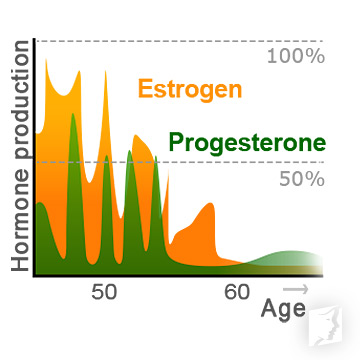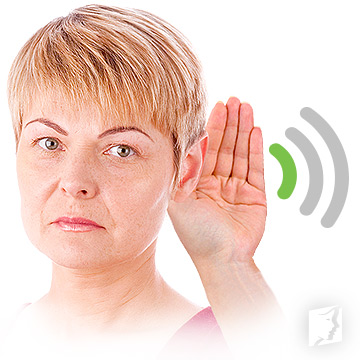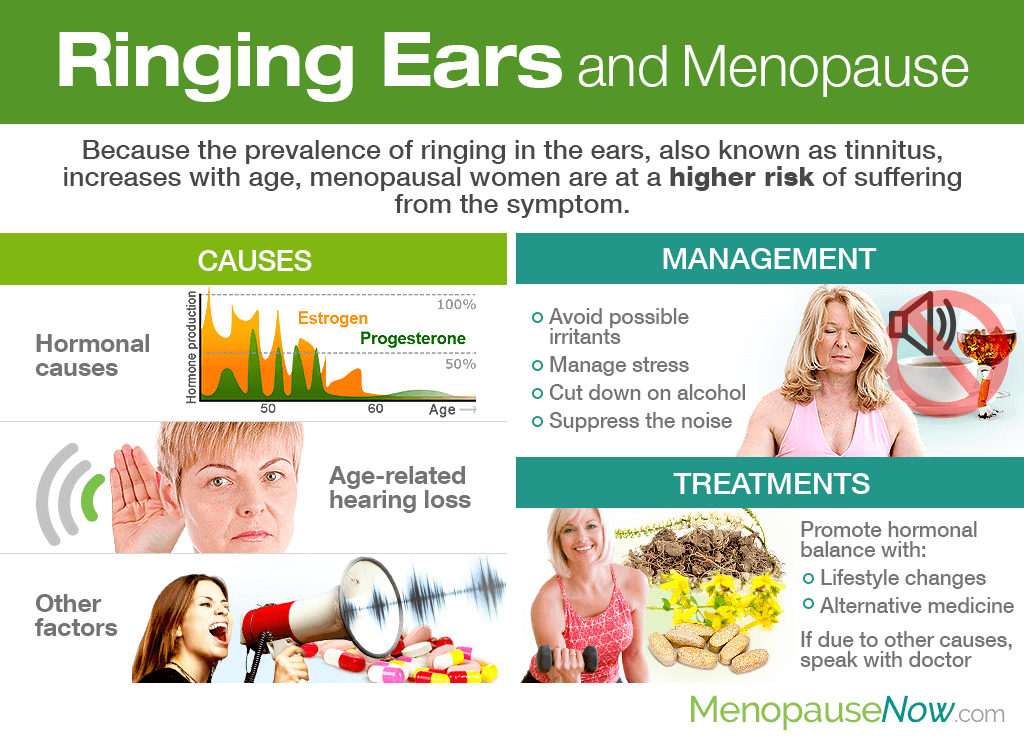Ringing in the ears, medically known as tinnitus, can drastically decrease quality of life with extreme cases being known to lead to suicidal behavior. Because tinnitus prevalence increases with age, menopausal women are at an augmented risk of suffering from it, making it all the more important for them to educate themselves about all aspects of the symptom.
Discover more about tinnitus and menopause below, including crucial information pertaining to what it is, its causes, treatments, and more.
About Tinnitus
Tinnitus is a perception of noise or ringing in the ears that affects up to 20 percent of all people.
Women who suffer from tinnitus often report phantom symptoms of ringing, buzzing, roaring, clicking, humming, or hissing in the ears.
It is important to note that tinnitus is not a condition itself, yet a symptom of an underlying health issue.
Causes of Menopause Tinnitus
The the link between tinnitus and menopause is still relatively unclear; however, its occurrence during the end to fertile years is generally accredited to hormonal imbalance, age, or possible other factors.
Hormonal imbalance

Reproductive hormones are suggested to have a possible association with tinnitus during the menopausal transition, though research is yet to solidify this. This hypothesis is further validated by the fact that tinnitus is also a common complaint during pregnancy, which is a period equally dominated by hormonal fluctuations.
Age

It is common for hearing to worsen with age, starting around age 60, which falls right in line with when women are transitioning out of fertile years. As such, tinnitus can be caused by age-related hearing loss, which is termed presbycusis.
Other factors
Other causes of tinnitus during menopause include exposure to loud noises; earwax blockages; chronic health conditions, like blood vessel disorders; medications; ear bone changes; and more.
Management for Menopause Tinnitus

Certain management techniques can be implemented so that women will notice the noise less than before, including by:
- Avoiding possible irritants. These include nicotine, caffeine, and loud noises, among others.
- Managing stress. Excess stress can worsen tinnitus. Practice deep breathing exercises, yoga, tai chi, biofeedback, or other stress management exercises.
- Cutting down on alcohol. Alcohol causes a greater blood flow to the ears by dilating the blood vessels, possibly worsening inner ear problems, like tinnitus.
- Suppressing the noise. Turning on low-volume radio static, a fan, soft simulated sounds, humidifiers, and air conditioners, as well as performing tinnitus retraining can all subdue the phantom noise women experience.
While managing tinnitus during menopause can bring women short-term relief, long-lasting results will only be found once the root cause is addressed.
Treatments for Menopause Tinnitus

While hormone replacement therapy (HRT) is often the first line of action for those suffering from menopause tinnitus, the symptom is possible to control with natural and effective menopause symptoms treatments that focus on targeting the underlying cause of hormonal imbalance.
Women are encouraged to pursue lifestyle changes that focus on an optimized diet rich in phytoestrogens, plant-based estrogens, for hormonal balance; regular exercise to boost mood; and wholesome habits consisting of those aforementioned.
In addition to these measures, for optimal endocrine system health, women should consider the use of alternative medicine such as phytoestrogenic herbal supplements or hormone-regulating supplements.
Phytoestrogenic herbal supplements - like St. John's wort or black cohosh - contain stronger concentrations of phytoestrogens to fill in estrogen deficiency that may be causing symptoms like menopause tinnitus. Work with a certified herbalist to create the treatment plan for your needs.
On the other hand, hormone-regulating supplements, such as Macafem, nourish the endocrine glands to produce more of their own hormones, removing the need to introduce outside hormones into the body, meaning they are safer for long-term use.
To find a treatment plan for menopause tinnitus caused by other factors not related to hormonal imbalance, speak with your doctor.
Key Takeaways
Tinnitus is a perception of noise or ringing in the ears that is not a condition itself, yet rather a symptom of an underlying health concern. Because its prevalence increases with age, researchers are trying to find the exact link between tinnitus and menopause to uncover its underlying causes. The most common in midlife women are hormonal imbalance and age-related hearing loss, yet medications, exposure to loud noises, ear bone changes, and other factors can also contribute to its occurrence. Management techniques of avoiding irritants, managing stress, cutting down on alcohol, and suppressing the noise can bring short-term relief, but ultimate, long-lasting relief is only achieved by treating the underlying cause. For many menopausal women, this is hormonal imbalance. As such, natural and effective treatment options include a combination of lifestyle changes alongside alternative medicine for best results.
Sources
- Chen, H. et al. (2018). Hormone replacement therapy decreases the risk of tinnitus in menopausal women: a nationwide study. Oncotarget, 9(28), 19807-19816. doi: 10.18632/oncotarget.24452
- Chrbolka, P. et al. (2017). Circulating steroids negatively correlate with tinnitus. Steroids, 123, 37-42. doi: 10.1016/j.steroids.2017.04.004
- Lai, J.T. et al. (2017). Hormone replacement therapy for chronic tinnitus in menopausal women: Our experience with 13 cases. Clinical Otolaryngology, 42(6), 1366-1369. doi: 10.1111/coa.12879
- Mayo Clinic. (2019). Tinnitus: Symptoms & causes | Diagnosis & treatment. Retrieved July 2, 2019, from https://www.mayoclinic.org/diseases-conditions/tinnitus/symptoms-causes/syc-20350156 | https://www.mayoclinic.org/diseases-conditions/tinnitus/diagnosis-treatment/drc-20350162

